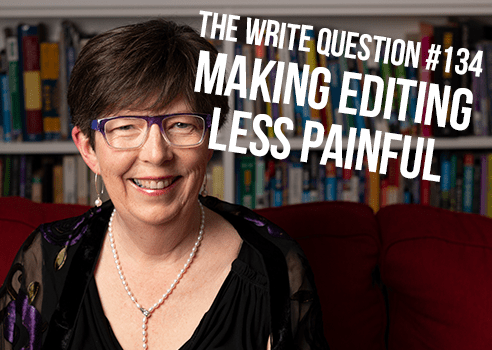Viewing time: 4 mins. 50 secs.
The Write Question is a weekly video podcast about writing that I started in 2017 and that ran, more or less weekly, until April 2022. This is a republication of issue #134, which discusses how to make editing less painful. The post first ran on April 3/20.
Transcript:
Have you ever wondered how to make editing less painful? That’s the topic I’m addressing today in The Write Question. I’m Daphne Gray-Grant, the Publication Coach.
I have a question from Emma White, a writer based in Oxford, Ohio. Here’s what she asked by email….
“The more I write, the more I realize how much of the technique of producing good work is through iterating and editing. I struggle with editing since I feel I can do it all day as I am dyslexic, and I fear it is a weakness. I am familiar with John McPhee’s theory of not expecting anything great until draft number four, but how do I balance sticking to editing if I would rather be writing and seeking novelty?”
Thanks for your question, Emma. You’re making me think of a statistic I often quote. Some 80 percent of the people I work with love editing and dislike writing. But the remaining 20 percent are like you: they love writing and dislike editing.
But ‘dislike’ is way too mild a word. Hate. Abhor. Loathe. Detest. Despise. All of those words would be much closer to the truth.
I wish I could tell you why this was so, but I suspect it’s genetic. Asking me to explain it is like asking why I was born a short brunette.
But just as hair dye could turn me into a redhead or a blonde, I think my suggestions could help you become a happier editor. Here’s my advice:
- Stop thinking of editing as boring and repetitive. Instead, see it as a chance to make your writing more appealing for your readers. View your editing self as a superhero who’s going to save the world from boredom and confusion. This is about way more important stuff than fixing spelling and grammar. This is about meaning. And interest. There’s nothing dull about that!
- Take a good long break before editing. For long-form projects like books or dissertations, I suggest people take six weeks. For more deadline-oriented stuff, like blog posts or essays, I suggest allowing at least a couple of days. If you are too close to the material, you won’t be able to edit it effectively. You need some distance and perspective before you can do the job well.
- Approach editing with very specific goals in mind. Many people simply read and re-read their text with the vague hope of making it better. This is frustrating and unrewarding and usually ineffective.
- Do a substantive or developmental edit first. This is an edit in which you address the content. Have you explained everything clearly and convincingly? Have you answered all the questions your readers are likely to have? Is your material in the best order? Is it interesting and engaging enough? Here’s a quick way to remember what substantive editing is all about: It is almost entirely analysis-based and it requires judgement, not just the application of rules.
- Last of all, copy edit. Copy editing is all about applying rules and you can use your computer to help you. In the notes below, I include a link to a blog post I’ve written on how to make copy editing more successful.
One additional tip might make a big difference for you, Emma. Figure out what time of day is best for you. Whenever I have to do something I’m not very enthusiastic about, I know I need to do it before 11 am, and even earlier might be better. But we’re all different, so identify the time that’s going to work best for you.
And remember to give yourself a reward for finishing — perhaps a specialty coffee of a chunk of really good chocolate.
Finally, let me wrap up with a quote from the poet and essayist T.S. Eliot: “Some editors are failed writers, but so are most writers.”
Emma, editing is hard work for some people. But don’t make it worse for yourself by dreading it. Resolve to find whatever enjoyment you can by approaching it as a reasonable and doable task.
*
If you’d like to learn more about how to make writing a happier and more rewarding process, check out my latest book Your Happy First Draft. I don’t sell it in bookstores or via Amazon. The only place to buy it is on my website, link below.


